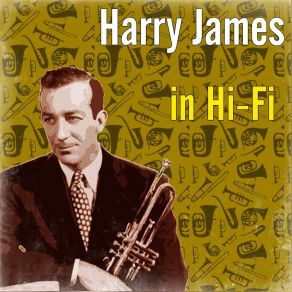Harry James in Hi-Fi
Download links and information about Harry James in Hi-Fi by Harry James. This album was released in 1955 and it belongs to Jazz genres. It contains 16 tracks with total duration of 48:18 minutes.

|
|
|---|---|
| Artist: | Harry James |
| Release date: | 1955 |
| Genre: | Jazz |
| Tracks: | 16 |
| Duration: | 48:18 |
| Buy it NOW at: | |
| Buy on iTunes $5.99 | |
Tracks
[Edit]| No. | Title | Length |
|---|---|---|
| 1. | Ciribiribin (Intro.) | 0:48 |
| 2. | Trumpet Blues | 2:42 |
| 3. | You Made Me Love You | 3:32 |
| 4. | James Session | 5:06 |
| 5. | I've Heard That Song Before | 2:57 |
| 6. | Cherry | 3:13 |
| 7. | I'm Beginning To See the Light | 3:09 |
| 8. | My Silent Love | 3:13 |
| 9. | Sleepy Lagoon | 3:10 |
| 10. | Two O'Clock Jump | 3:01 |
| 11. | I Cried For You | 3:20 |
| 12. | Jalousie | 3:11 |
| 13. | It's Been a Long, Long Time | 3:08 |
| 14. | Velvet Moon | 3:40 |
| 15. | Music Makers | 3:12 |
| 16. | Ciribiribin (Finale) | 0:56 |
Details
[Edit]Capitol Records' catalog originally wasn't too strong in big band or swing music, the label having been founded in 1941 and, thus, managing to miss out on the prime prewar years for both musical booms, and then running smack into a series of recording bans by the Musicians' Union during the early '40s. But the company was smart enough to quickly embrace the conversion from disc recording to magnetic tape in the late '40s, and also the switch from 78s to LPs, and to tally the effects of these developments; it also recognized the fact that a big chunk of the swing audience was still viable (if not exactly dominating the music marketplace), 10-15 years older, and no longer worrying about World War II, mostly settled into middle-class life and happy to feed their turntables with music that they loved. And Capitol's A&R men were shrewd enough to see that some of the surviving swing acts had done more than hold their own — they were just about as good as ever, even if they weren't rewriting the book on popular music anymore, and the recording and playback technology in existence in 1955 could let them really show what they could do. The result was the label's signing of acts such as the Andrews Sisters, Benny Goodman, and Harry James, all of whom were able to remake and, in some instances, refine their classic sides. Harry James had the most success of any of these "new" old artists, to judge from the sheer number of recordings he got to do — five LPs in all at a time when LPs were major projects. To judge from this first release, they had the stuff they needed; not to knock their classic '40s sides, but this band, including the string section, seemed to revel in the fact that modern microphones and playback were going to give back to the listener at home every detail of their work on these sessions. Yes, the originals may have had more immediacy and been on (or near) the cutting-edge of pop, but the album's opener, "You Made Me Love You," with its achingly beautiful James solo and elegant string accompaniment, shows the value of taking a second crack at a classic, while "Sleepy Lagoon," with its gently pulsing strings and elegant piano introduction leading into an exquisite solo by James, is gorgeous enough for the listener to lose him or herself in. "Trumpet Blues" could have been done a decade earlier, but listeners wouldn't have James' trumpet as finely delineated as it is here. And then there's Helen Forrest, called in to re-create her two biggest hits with the band, "I've Heard That Song Before" and "I Cried for You," plus sub for her replacement, Kitty Kallen, on "It's Been a Long, Long Time" and "I'm Beginning to See the Light"; she steps up and, with help from some beautiful little acoustic guitar flourishes around the bolder sounds of trumpet and sax, turns in a refreshing performance of the period pop hit. Only "My Silent Love" (featuring Bobby Marlo subbing for Dick Haymes) and "It's Been a Long, Long Time" take on an overly nostalgic mood, and with the latter song it would be impossible for it not to do so. The album closes with two hot instrumentals, "Two O'Clock Jump," James' answer to Count Basie's "One O'Clock Jump," owing as much to Benny Goodman as it does to Basie, which is recorded so cleanly that every nuance is audible and one even gets a sense of the room ambience, and "James Session," a showcase for James and drummer Jackie Mills that was obviously patterned on Benny Goodman's "Sing, Sing, Sing," five minutes of the band (and the two soloists) sending the music boiling right up to the edge of their musical containment; "Ciribiribin" bookends the album as an intro and outro. The dance music audience devoured Harry James in Hi-Fi, while swing music enthusiasts eager to hear some of their favorite music fully realized regarded this and records like it as a gift of serendipity amid the increasingly dominant sounds of R&B and rock & roll; it was successful enough to yield a follow-up and start a three-year relationship between James and Capitol that would go in some more ambitious directions.